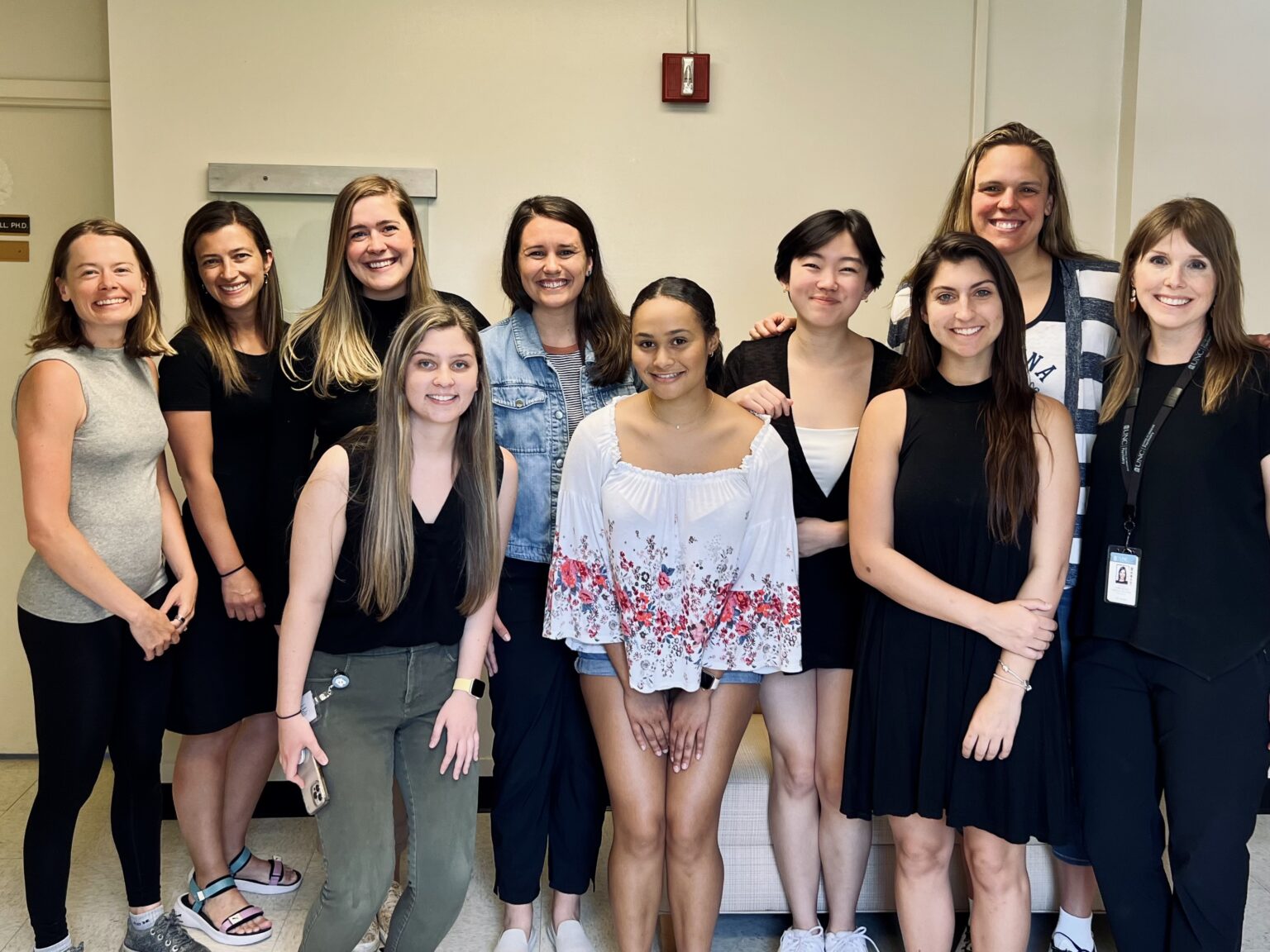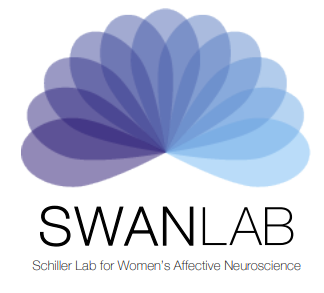Find a CBT Therapist
Search through our directory of local clinicians.
The Schiller Lab for Women’s Affective Neuroscience (SWAN)
Meet ABCT’s Featured Lab
The Schiller Lab for Women’s Affective Neuroscience (SWAN), located in the Center for Women’s Mood Disorders in the UNC Department of Psychiatry, is directed by Crystal Schiller, Ph.D.

Trainee Lab Members

Melissa Walsh, PhD, Postdoctoral Fellow
I am interested in understanding how neurobiological changes across the menopause transition increase dementia risk in susceptible women and developing and testing preventative interventions to offset risk.

Danielle A. Swales, PhD (she, her/s), Postdoctoral Fellow
My program of research broadly investigates the biological and psychosocial determinants of perinatal mental health, and the impact of perinatal distress on child development.
I am interested in how this work can inform the timing and targets of interventions to confer two-generation benefit. I am interested in how this work can inform the timing and targets in pregnancy and the postpartum period as sensitive window for prevention and early intervention efforts to support the wellbeing of birthing parents and disrupt the intergenerational transmission of stress.
I am interested in research that informs the timing and targets of interventions that alleviate symptoms and disrupt the intergenerational transmission of risk for psychopathology.

Julianna Prim, PhD, Postdoctoral Research Fellow
I am interested in the feasibility and utility of smartwatch technology to collect objective (behavioral and physiological) research data to detect periods of affective switching (i.e. mood transitions to euthymia to depression) in populations with regularly occurring mood changes (premenstrual dysphoric disorder PMDD).
The long-term development of a prediction model that identifies variables that increase risk for affective switching can lead to early detection and prevention prospectively.

Lis Bernhardt, RN, BSN, Graduate Research Assistant
My research interest focuses on early detection of maternal distress symptoms during the perinatal period by examining neurological reward responsivity, mother-child interaction patterns, and maternal self-regulation. I’m primarily interested in leveraging this research to prevent perinatal depression and transmission of intergenerational mental health complications
Jolie Jeffrey, Undergraduate Research Assistant
My research interest includes studying the various factors, influences, and unknown experiences of racial minorities or underrepresented populations with mental illnesses and disorders.
I am also interested in how intersectionality (the experiences of black women for example) plays a role in the onset of mental health issues.
My goal is to shed light on the stigmas and lack of knowledge about various mental health issues that underrepresented minorities face in order to increase social support, understanding of mental health, and access to proper mental healthcare.

Samantha Hellberg, MA, Graduate Research Assistant
My primary research interests focus on emotional distress and dysregulation, trauma/PTSD, digital mental health, and person-centered methods. I aim to leverage work in these areas to help increase access to effective perinatal mental healthcare and reduce the intergenerational transmission of trauma and mental health risks.
I first joined ABCT while completing my post-bac research assistantship. As a post-bac member, I was able to develop my research interests, network with experts in the field (and potential graduate mentors!), and receive instrumental mentorship while applying to graduate school. Since beginning my PhD in Clinical Psychology at UNC Chapel Hill, ABCT has remained a core component of my education and my professional development.
I have been able to meet and stay connected with so many colleagues, collaborators, and mentors at the annual convention, and find this meeting also sparks new ideas for how I can strengthen my clinical and research practices. Over the past few years, I have been glad to see ABCT’s increased commitment to diversity, justice, and inclusion initiatives, and my clinical and research training has significantly benefitted from the talks, webinars, and resources offered in these areas.
It’s great to give back to ABCT throughout graduate school through service roles with the Technology & Behavior Change SIG and the Membership Committee. Most saliently, I benefitted greatly from all the resources ABCT provides around the pre-doctoral internship process.
As I make the transition to internship this summer, I am grateful for all the ways that ABCT has supported my learning, growth, and professional development throughout graduate school!
I would definitely recommend students attend the annual convention, and if you can, join a SIG or two in your primary areas of research/clinical interest beforehand. The conference can be overwhelming, particularly as an undergraduate or postbac, and SIGs can provide a lower-pressure way to connect with fellow trainees and professionals.
The SIGs often host events at and/or outside of the convention, and since they’re “special interest” groups, it makes it easy to find others who share your primary interests. Several SIGs also have set up “conference buddy” matches, so folks who are newer to the convention can connect with someone who has overlapping interests and can help them in making the most of the convention.
The Technology & Behavior Change SIG has been vital for supporting my access to specialized mentorship, resources, and professional opportunities. I’d definitely recommend checking it out if you’re interested in digital mental health!

Erin Bondy, PhD, Postdoctoral Fellow
I am interested in the interaction of immune/inflammatory pathways and neural circuits implicated in reward processing within the context of depression and anhedonia. I hope to study how reproductive hormones influence these biological systems and contribute to the onset and maintenance of depression during perinatal and perimenopausal windows.

Kate Gibson, BS, Postbaccalaureate Research Assistant
My primary research interest is in the underlying neural mechanisms behind mood disorders, especially related to how these mechanisms influence mental health treatments and outcomes in women during periods of hormone transition.

Megan Hynd, BA, Graduate Research Assistant
I am primarily interested in how experimental therapeutics modulate neuroendocrine processes to alleviate mood symptoms, specifically in major depressive disorder (MDD).

Reese Gray, Undergraduate Research Assistant
I am particularly interested in working with youth who are at higher risk for entering the criminal justice system due to untreated or under-treated mental illness. I hope to research ways to intervene early so that the child is less likely to serve prison time or develop maladaptive habits/coping mechanisms and can thrive into adulthood.
Crystal Schiller, Ph.D.

Crystal Schiller is an Associate Professor of Psychiatry in the UNC School of Medicine and a licensed clinical psychologist with expertise in reproductive-related mood disorders. Dr. Schiller also serves as Associate Director of the UNC Center for Women’s Mood Disorders and Director of the UNC School of Medicine Psychology Internship Program. Her NIH-funded program of research focuses on the use of experimental models to determine the effects of reproductive hormones on brain function and affective symptoms in women and to improve access to mental healthcare for perinatal women.
The Schiller Lab for Women’s Affective Neuroscience (SWAN) is an interdisciplinary team of researchers and students focused on identifying the neuropathophysiology of reproductive-related mood disorders and advancing evidence-based psychotherapy. Our research has demonstrated the role of reproductive hormones in depression and anxiety during and after pregnancy and during the menopause transition. Our ongoing research aims to explain how normative changes in ovarian hormones over the course of the reproductive lifespan trigger mood dysregulation in some but not all people. Increasingly, our research focuses on issues related to diversity and equity in reproductive science, clinical psychology, and access to treatments that work.
How often and why do you attend the ABCT convention?
I have been attending annually since 2019 to present as part of clinical roundtables or symposia focused on women’s mental health. I have grown to value the convention as an important opportunity to connect with colleagues, potential collaborators, and future trainees.
How do you stay current with developments in the field (research and/or practice and/or policy)?
I stay current by attending annual meetings, being strategic about selecting continuing education courses and workshops, hosting and attending departmental and institutional seminars, and reading journal articles.
How has ABCT helped you/your lab professionally (e.g., network/collaborate, stay current with developments in the field, meet prospective/former trainees)?
ABCT has provided networking opportunities to develop new collaborations and meet both prospective and former trainees. I have also appreciated the rich and informative discussions on women’s mental health and trauma-informed care that the round table and symposium formats have enabled.
Does your lab have any traditions? Does your lab do anything together for fun?
We participate in the Foundation of Hope’s Annual Walk for Hope to raise funding for mental health research.
We also celebrate submissions—grant submissions and paper submissions—rather than outcomes. Acknowledging and celebrating the tremendous effort required to see a project through to dissemination or to submit an NIH grant application is critical because effort expenditure is not always related to the outcome (i.e., manuscript acceptance or grant funding), which depends on a variety of factors outside of our control.
During the pandemic, we started a book club focused on social justice in science and medicine. We discuss a chapter every other week during our lab meeting and create an action guide for each book to improve each step of the research process from identifying key research questions to disseminating results.
Finally, we recently transitioned back to holding our weekly lab meeting in person. Although the virtual meetings enabled increased efficiency, we have found that spontaneous, informal lunch meetings improve our team cohesion, facilitate the exchange of ideas, and promote creativity in a way that virtual meetings did not.
What advice would you give prospective trainees?
My lab trains high school interns, undergraduate students, graduate students, psychology interns, postdoctoral fellows, and junior faculty members. At every stage of this developmental trajectory, an openness to learning, curiosity to understand alternative perspectives, and dedication to discovery are required. Punctuality, attention to detail, and dedication to excellence are also required but are not sufficient to be successful in my lab.
Many applicants apply to work in my lab with very specific ideas about the clinical questions and research topics they’re interested in pursuing, but in my view, the most important thing trainees should be looking for early on is training in the scientific method and general research skills. Interests in content areas often change throughout one’s research training but rigorous training in clinical research methods will serve you well throughout your career.

